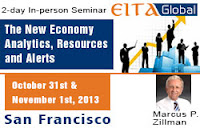Overview:
Gone are the days of
business-as-usual tranquility. As today's competitive advantage may be a
disadvantage as soon as tomorrow, long-run superior performance calls for
non-stop innovation of new value. An agile enterprise must continually
change and must even be able to reinvent its core essence in the face of major
business discontinuities.
There is hardly any business change in which information
technology (IT) does not play a role. In contrast, change
is increasingly IT-driven. In addition to cost efficiency and reliability of
operations, the role of IT as the enabler of organizational agility and
innovation is increasing in importance.
 Why should you attend: Information Technology (IT) has a fundamental
impact in organizations and the society at large: unprecedented computing
power, infinity of virtual space and ubiquitous connectivity present an
enormous potential to create enterprise effectiveness, increase flexibility and
enable entirely new business models.
Why should you attend: Information Technology (IT) has a fundamental
impact in organizations and the society at large: unprecedented computing
power, infinity of virtual space and ubiquitous connectivity present an
enormous potential to create enterprise effectiveness, increase flexibility and
enable entirely new business models.
The traditional "IT follows business" approach may have worked
reasonably well in the relatively stable and predictable business environments
of the past, but it falls increasingly short in the face of today's dynamic
markets, where competitive advantage is in a continuous flux. In these
turbulent times, IT must redeem its promise as a competitive weapon and
determine the way in which business is conducted.
Areas Covered in the Session:
Agile Strategy
Agile Organization
Agile Leadership
Agile Governance
Agile Architecture
Agile IT
Who Will Benefit:
CEO
Executive Vice president
General Manager
CIO
About Speaker
-
 Janne J. Korhonen is an independent business and IT consultant, specializing in
organization design, enterprise architecture and governance. He brings
long-time versatile experience as an architect and consultant in a variety of
strategic, enterprise-scale and mission-critical IT projects. In his
consulting, he leverages multi-disciplinary research insights and leading edge
practices to facilitate systemic co-development of technological,
organizational and individual capabilities. He is specialized in how
information technology can be governed and applied strategically to catalyze
organizational agility. His interventions aim at transformational vertical
development with the potential of order-of-magnitude gains.
Janne J. Korhonen is an independent business and IT consultant, specializing in
organization design, enterprise architecture and governance. He brings
long-time versatile experience as an architect and consultant in a variety of
strategic, enterprise-scale and mission-critical IT projects. In his
consulting, he leverages multi-disciplinary research insights and leading edge
practices to facilitate systemic co-development of technological,
organizational and individual capabilities. He is specialized in how
information technology can be governed and applied strategically to catalyze
organizational agility. His interventions aim at transformational vertical
development with the potential of order-of-magnitude gains.
.jpg)
.jpg)

.jpg)


.jpg)


.jpg)
.jpg)
.jpg)



.jpg)